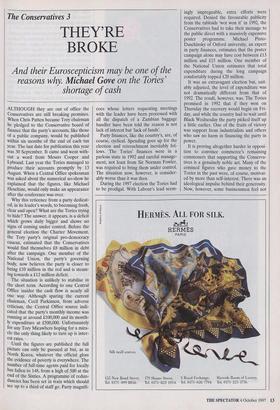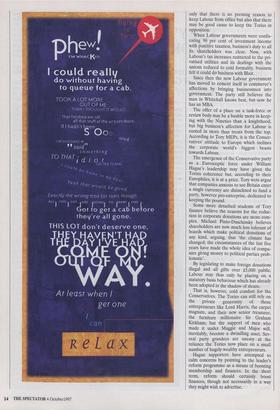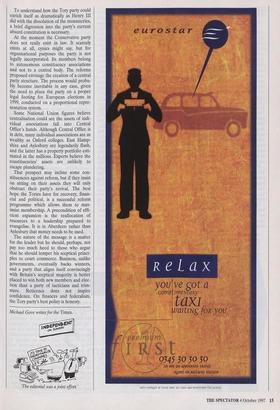The Conservatives 3
THEY'RE BROKE
And their Euroscepticism may be one of the shortage of cash
ALTHOUGH they are out of office the Conservatives are still breaking promises. When Chris Patten became Tory chairman he pledged to the Conservative board of finance that the party's accounts, like those of a public company, would be published within six months of the end of each tax Year. The last date for publication this year was 30 September. It came and went with- out a word from Messrs Cooper and Lybrand. Last year the Tories managed to produce their accounts promptly by 13 August. When a Central Office spokesman was asked about the numerical no-show he explained that the figures, like Michael Heseltine, would only make an appearance after the conference was over.
Why this reticence from a party dedicat- ed, in its leader's words, to becoming fresh, clear and open? What are the Tories trying to hide? The answer, it appears, is a deficit Which grows daily bigger and shows no Signs of coming under control. Before the general election the Charter Movement, the Tory party's original pro-democracy caucus, estimated that the Conservatives would find themselves £8 million in debt after the campaign. One member of the National Union, the party's governing body, now believes the party is closer to being £10 million in the red and is steam- ing towards a £12 million deficit.
The situation is unlikely to stabilise in the short term. According to one Central Office insider the cash flow is nearly all one way. Although sparing the current chairman, Cecil Parkinson, from adverse criticism, the Central Office source indi- cated that the party's monthly income was running at around £100,000 and its month- ly expenditure at £500,000. Unfortunately for any Tory Micawbers hoping for a mira- cle the only thing likely to turn up is inter- est rates.
Until the figures are published the full Picture can only be guessed at but, as in North Korea, whatever the official gloss the evidence of poverty is everywhere. The number of full-time agents paid for locally has fallen to 148, from a high of 500 at the end of the Sixties. A programme of redun- dancies has been set in train which should see up to a third of staff go. Party magnifi- coes whose letters requesting meetings with the leader have been processed with all the dispatch of a Zambian baggage handler have been told the reason is not lack of interest but 'lack of funds'.
Party finances, like the country's, are, of course, cyclical. Spending goes up for the election and retrenchment inevitably fol- lows. The Tories' finances were in a parlous state in 1992 and careful manage- ment, not least from Sir Norman Fowler, was required to bring them under control. The situation now, however, is consider- ably worse than it was then.
During the 1997 election the Tories had to be prodigal. With Labour's lead seem- ingly impregnable, extra efforts were required. Denied the favourable publicity from the tabloids `wot won it' in 1992, the Conservatives had to take their message to the public direct with a massively expensive poster programme. Michael Pinto- Duschinsky of Oxford university, an expert in party finances, estimates that the poster campaign alone may have cost between £13 million and £15 million. One member of the National Union estimates that total expenditure during the long campaign comfortably topped £20 million.
It was an extravagant election but, suit- ably adjusted, the level of expenditure was not dramatically different from that of 1992. The result, however, was. The Tories promised in 1992 that if they won on Thursday the recovery would begin on Fri- day, and while the country had to wait until Black Wednesday the party picked itself up a little earlier. One of the fruits of victory was support from industrialists and others who saw no harm in financing the party in power.
It is proving altogether harder in opposi- tion to convince commerce's remaining commoners that supporting the Conserva- tives is a genuinely noble act. Many of the ermined figures who gave money to the Tories in the past were, of course, motivat- ed by more than self-interest. There was an ideological impulse behind their generosity. Now, however, some businessmen feel not only that there is no pressing reason to keep Labour from office but also that there may be good cause to keep the Tories in opposition.
When Labour governments were confis- cating 98 per cent of investment income with punitive taxation, business's duty to all its shareholders was clear. Now, with Labour's tax increases restricted to the pri- vatised utilities and its dealings with the unions reduced to cold formality, business felt it could do business with Blair.
Since then the new Labour government has moved to cement itself in commerce's affections by bringing businessmen into government. The party still believes the man in Whitehall knows best, but now he has an MBA.
The offer of a place on a task-force or review body may be a bauble more in keep- ing with the Nineties than a knighthood, but big business's affection for Labour is rooted in more than treats from the top. According to Tory MEPs, it is the Conser- vatives' attitude to Europe which inclines the corporate world's biggest beasts towards Labour.
The emergence of the Conservative party as a Eurosceptic force under William Hague's leadership may have given the Tories coherence but, according to their Europhiles, it is at a price. Tory wets argue that companies anxious to see Britain enter a single currency are disinclined to fund a party, however pro-enterprise, dedicated to keeping the pound.
Some more detached students of Tory finance believe the reasons for the reduc- tion in corporate donations are more com- plex. Michael Pinto-Duschinslcy believes shareholders are now much less tolerant of boards which make political donations of any kind, arguing, that 'the climate has changed; the circumstances of the last five years have made the whole idea of compa- nies giving money to political parties prob- lematic'.
By legislating to make foreign donations illegal and all gifts over £5,000 public, Labour may thus only be placing on a statutory basis behaviour which has already been adopted in the shadow of sleaze.
That is, however, cold comfort for the Conservatives. The Tories can still rely on the private generosity of those entrepreneurs like Lord Harris, the carpet magnate, and their new senior treasurer, the furniture millionaire Sir Graham Kirkham; but the support of men who made it under Maggie and Major will, inevitably, become a dwindling asset. Sev- eral party grandees are uneasy at the reliance the Tories now place on a small number of hugely wealthy entrepreneurs.
Hague supporters have attempted to calm concerns by pointing to the leader's reform programme as a means of boosting membership and finances. In the short term, reform should certainly boost finances, though not necessarily in a way they might wish to advertise. To understand how the Tory party could enrich itself as dramatically as Henry III did with the dissolution of the monasteries, a brief digression into the party's current absurd constitution is necessary.
At the moment the Conservative party does not really exist in law. It scarcely exists at all, cynics might say, but for organisational purposes the party is not legally incorporated. Its members belong to autonomous constituency associations and not to a central body. The reforms Proposed envisage the creation of a central party structure. The process would proba- bly become inevitable in any case, given the need to place the party on a proper legal footing for European elections in 1999, conducted on a proportional repre- sentation system.
Some National Union figures believe centralisation could see the assets of indi- vidual associations fall into Central Office's hands. Although Central Office is in debt, many individual associations are as wealthy as Oxford colleges. East Hamp- shire and Aylesbury are legendarily flush, and the latter has a property portfolio esti- mated in the millions. Experts believe the constituencies' assets are unlikely to escape plundering.
That prospect may incline some con- stituencies against reform, but if they insist on sitting on their assets they will only obstruct their party's revival. The best hope the Tories have for recovery, finan- cial and political, is a successful reform programme which allows them to max- imise membership. A precondition of effi- cient expansion is the reallocation of resources to a leadership prepared to evangelise. It is in Aberdeen rather than Aylesbury that money needs to be used.
The nature of the message is a matter for the leader but he should, perhaps, not pay too much heed to those who argue that he should temper his sceptical princi- ples to court commerce. Business, unlike governments, eventually backs winners, and a party that aligns itself convincingly with Britain's sceptical majority is better placed to win both new members and elec- tion than a party of tacticians and trim- mers. Reticence does not inspire confidence. On finances and federalism. the Tory party's best policy is honesty.
Michael Gove writes for the Times.
The editorial was a joint effort.'












































































 Previous page
Previous page